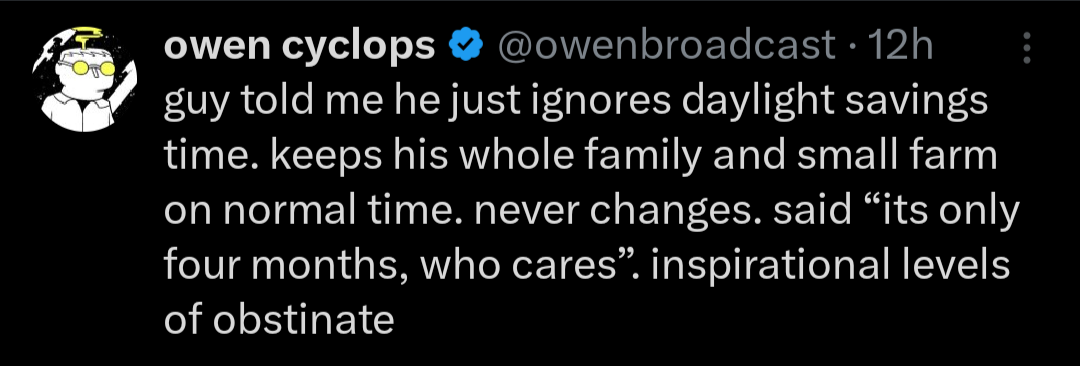this post was submitted on 07 Oct 2024
1140 points (99.4% liked)
People Twitter
6864 readers
2294 users here now
People tweeting stuff. We allow tweets from anyone.
RULES:
- Mark NSFW content.
- No doxxing people.
- Must be a pic of the tweet or similar. No direct links to the tweet.
- No bullying or international politcs
- Be excellent to each other.
- Provide an archived link to the tweet (or similar) being shown if it's a major figure or a politician.
founded 2 years ago
MODERATORS
you are viewing a single comment's thread
view the rest of the comments
view the rest of the comments

Basically you have several scenarios:
and several topics you could talk about
Assuming any initial adjustments to new systems are ignored for the purposes of the next paragraphs.
Any system is really not a big deal for local communication since everyone knows which hours are sleeping hours and which season it is (day length,...).
Communication with people on the other hemisphere uses the same times, except when DST fucks it up, sometimes at different changeover dates and in different directions if both use DST. Day lengths, sunrise/sunset, temperatures,... all differ and are not really comparable unless you mentally apply a six month offset to your own experiences.
Communications with people far away in west/east direction requires knowledge about the timezone offset, sometimes half hour or 15 minute offsets, as well as potential DST changeover dates and if they use DST at all. Every time you want to schedule anything you need to mentally convert that time to either something like GMT/UTC you use for scheduling or to the other person's schedule. If you have a regular event that happens at time x every week DST changes can make it change up to 4 times a year if both places use different DST changeover dates.
Day length and what is sunrise and sunset only really work without problems if you live at comparable distances from the equator, temperatures are influenced by things like the gulf stream and other weather patterns and geography (nearby oceans, mountains,...) in addition to the day length. So you have to figure out more details here anyway.
So basically you can communicate about any of that stuff clearly just based on assumptions in the current system mainly with people who live in the same place as you do or with people who live in a geographically very similar place that observes the same DST rules yours does and is the same distance from the equator assuming the other person has a similar sleep schedule as you do.
And the cost for that is that anyone who ever wants to schedule anything with someone who lives a bit further away has to do some mental gymnastics and know a lot about the system of timezones and DST for everyone involved.